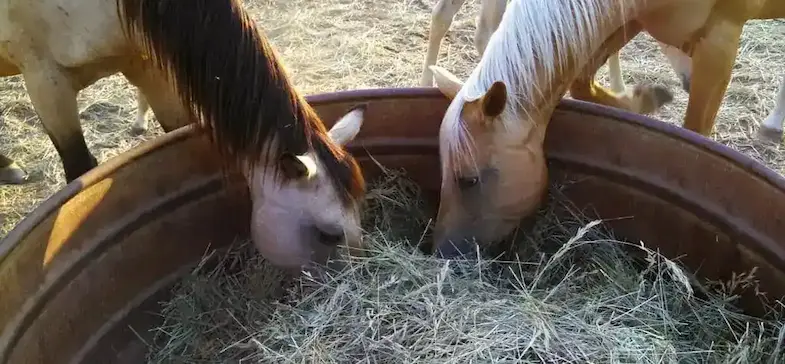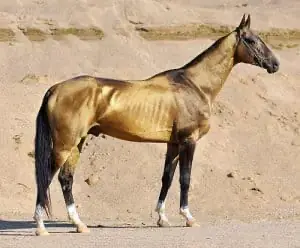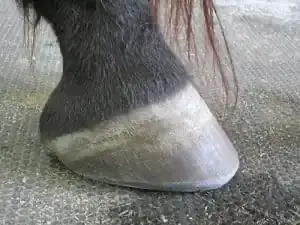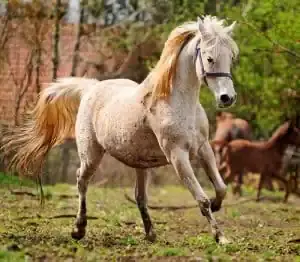The simple answer to the question of whether horses need supplements or not depends a lot on what the supplements are for and your horse’s lifestyle. For example, if your horse has a healthy balanced diet and you’re thinking of feeding him extra minerals then, of course, he doesn’t need them. If, on the other hand, your horse doesn’t have a lot of forage but has a high grain diet then topping his feed up with a mineral supplement such as potassium, iron or magnesium is a good idea. Also if your horse is very active due to being on heavy work then you may also consider a performance or energy supplement.
Do horses need supplements? Competition horses and those with health conditions preventing them from getting the vitamins and minerals they need from their diet will benefit from supplements. On the other hand, horses on light work and those that are able to get everything they need from the normal diet won’t need them.
What are horse supplements?
Broadly speaking a supplement is anything that is fed to a horse on top of forage but this is more of a definition of the word rather than what supplements are in the real world. In reality, supplements are additional nutrients, vitamins, minerals, proteins, etc that are fed to horses to either boost their diet or to make up for something they’re lacking or are deficient in.
Just like us, there can be any number of reasons why a horse may need to use supplements, they may have a health issue such as being slow to heal, have poor hoof growth or have joint problems. Supplements can also be used to improve a horse’s competition performance, increase their stamina or boost their energy levels.
Are supplements necessary for horses?
Some people rightly argue that horses survived for centuries (if not millennia) before the invention of supplements and while this is, of course, true, they lived very differently from how they do now. That’s not to say that supplements are necessary for all horses or that every horse will benefit from them though. Instead, you need to consider your horse’s diet, his needs as well as his workload.
Do horse supplements really work?
There’s no doubt that supplements can, and do, work but it’s important to give the right supplements to the right horses, after all, there’s no point feeding a performance-enhancing supplement to a riding school horse. Likewise, if you compete a lot then your horse probably doesn’t need an arthritis supplement.
Are all supplements good?
A lot of countries have strict laws in place that govern the sale of foods and drugs but like most supplements (with the exception of those prescribed by vets) aren’t classed as either there aren’t many regulations surrounding their sale. That’s not to say you shouldn’t buy and use supplements, just be careful of where you buy them from. There are plenty of supplements that have been scientifically tested but just because a product hasn’t it doesn’t necessarily mean you should avoid it, instead, use your instincts – if it seems too cheap or you don’t know anything about the seller then it’s better to be safe. There are plenty of reputable companies that have a proven track record of selling supplements, companies such as Entirely Pets, Heartland Veterinary Supply & Pharmacy, or LV Performance, both of which offer international delivery.
What supplements should I give my horse?
These days there are dozens of different supplements that offer a multitude of benefits so what you give to your horse should be based on your reasons for using it in the first place. After all, there’s no one supplement to cover everything, that said though there are a number of vitamins and minerals that have multiple benefits, vitamins such as biotin, for example, can be used to improve a horse’s coat, skin, and hooves as well as help to promote a healthy gut.
Supplements for your horse’s coat and skin
If your horse’s coat is dull, lacks condition, or is rather thin and brittle, or if his skin is dry then it could be he’s not getting enough of the right nutrients from his diet to produce a healthy coat. If this is the case then you might want to think about feeding him a supplement that has been specially formulated to improve his coat. Most of these supplements will contain things like omega 3 and flaxseed, both of which will help to maintain a shiny coat as well as strengthening your horse’s hooves. Fatty acids, along with vitamins E, B12, niacin, and biotin are also used to help improve the condition and health of a horse’s coat and his skin.
Supplements for your horse’s hooves
Horses’ hooves are made from keratin which is the same protein that our hair and nails are made from. Keratin is very tough but it can crack and split if your horse’s hooves aren’t healthy but don’t worry, just as we can take supplements to improve the strength and quality of our hair and nail so can horses. Calcium is one of the most important vitamins when it comes to producing healthy hooves but biotin, zinc, and copper are also very important.
If you want to buy supplements for your horse’s hooves Entirely Pets have a great selection, plus they offer international delivery.
Supplements for your horse’s joints
Horses are no different to us in that as they get older their joints can ache and cause them a lot of pain and discomfort. The good news though is that despite the fact that horses put a lot more weight and therefore stress on their joints the same supplements that work for us also work for horses. The most common are cod liver oil (although I fully appreciate some people aren’t keen on feeding their horse anything from another once-living creature) and glucosamine, both of which work by slowing the breakdown of cartilage and therefore helping to heal existing injuries. Hyaluronic Acid and MSM (Methylsulfonylmethane) are also used to help to treat joint pain but they work more as anti-inflammatories to reduce the swelling and pain rather than to repair the joints.
Supplements for your horse’s health
Supplements for your horse’s health are probably the most popular and numerous but when you consider that it covers such a wide gamut it’s not surprising, for example, supplements to aid digestion, boost the immune system, or even regulate breathing all fall under the banner of health supplements. Because there are so many supplements for health I thought it might be better to list the vitamins and minerals below along with a brief summary of what they’re used for or important for.
| Mineral | Use |
|---|---|
| Calcium | Mainly for healthy teeth and bone as well as an enzyme regulator |
| Magnesium | For muscle and nerve function as well as relaxing a horse |
| Phosphorus | Helps in the production of energy but also contributes to a healthy pH and electrolyte balance |
| Potassium | An electrolyte used for overall health but also for normal muscle function |
| Sodium | Restores salts lost during exercise but also helps with the central nervous system and movement of fluid around the body |
| Chloride | Like sodium, chloride is a salt that helps with the movement of bodily fluids but also helps to regulate the central nervous system and keep it healthy |
| Sulfur | To help produce healthy hair, skin, and hooves |
| Cobalt | Originally used to treat anemia it has, in recent years, been used to boost a horse’s performance |
| Copper | To reduce inflammation as well as produce strong blood vessels, bones, joints, and hair |
| Fluorine | Can improve the strength of teeth and bones in small doses. Can cause lameness if used too much thoughIodineTo help regulate a horse’s metabolism but a lack of iodine can result in a dull coat and flaky skin IronIron is vital for the health of red blood cells and prevention of anemiaManganeseHelps to breakdown fats and carbohydrates but is also vital in the production of cartilageSeleniumTo help boost the effectiveness of the immune system and protect against viruses and infections |
| Zinc | To help maintain healthy hooves, a well-conditioned coat, and strong bones. It’s also used to strengthen the immune system |
| Vitamin | Important For |
|---|---|
| Vitamin A | Night vision, fertility (and fetus development), hoof, and skincare as the immune system |
| Vitamin C | The immune system but also for protecting the lungs from damage |
| Vitamin D | For absorbing and transporting calcium around the body |
| Vitamin E | Protecting the body from everyday oxidative damage and developing and maintaining healthy muscles, nerves, and immune system |
| Vitamin K | Healthy blood and preventing blood clots |
| Thiamine (B1) | Metabolizing proteins, fats, and carbohydrates as well as for improving a horses power and energy |
| Riboflavin (B2) | The production of energy but also the immune system |
| Niacin (B3) | Performance but can also help with digestion and the health of the skin |
| Pantothenic Acid (B5) | Digestion and metabolism of proteins, fats, and carbohydrates |
| Pyridoxine (B6) | Muscle development by metabolizing protein |
| Biotin (B7) | Hoof health as well as the condition of the horse’s coat |
| Folic Acid or Folate (B9) | Preventing (or controlling) anemia by keeping red blood cells healthy |
| Cobalamin (B12) | Fighting tiredness but also used by red blood cells |
Supplements for your horse’s performance
When you talk about supplements to improve performance most people automatically think of steroids but while there may or may not be a use for steroid supplements within the equine world I’m not going to cover that here, instead, I’m just focusing on the ‘natural’ supplements.
With this in mind, most performance supplements will contain a certain amount of glucosamine to help prevent any stiffness of joints. Supplements are also likely to contain minerals such as phosphorus and potassium, both of which are electrolytes (Electrolytes are essential minerals found in blood, sweat, and urine. They’re crucial in many of the body’s functions from contracting muscles to sending nerve impulses and regulating the body’s pH levels) that are used in the production of energy and muscle function.
Supplements for your horse’s weight
If your horse is a hard keeper it can be very difficult to maintain his weight (or increase it) with diet alone which is where the use of supplements can be very helpful. On top of your horse’s diet, you can also use supplements to increase his intake of fiber, starch, protein, and fat as well as certain vitamins and minerals. As a rule supplements for hard keepers (or just general weight gain) will include some form of fat, whether it’s from vegetable oil or some other oil, protein, and fiber along with a mix of vitamins and minerals.
When it comes to weight loss though there are two types of supplements, the mix which as you would expect contains a mixture of different ingredients or the single-ingredient supplements. The most common weight loss ingredients are:
- Chromium* – A mineral that helps the body to metabolize carbohydrates, lipids (Any organic compound that are either fatty acids or derived from them. They include things such as natural oils and waxes.)] and proteins. It controls the sugar levels in the blood which helps to maintain a normal body weight
- L-carnitine* – Sometimes called a weight-loss wonder, L-carnitine works by increasing the amount of energy the body uses to metabolize fat and sugar.
- Zinc – Another mineral, zinc works by helping the body to better use the insulin it has. When feeding zinc to your horse it’s important to feed it with a 5:1 ration of copper, this is because too much zinc can result in a copper deficiency.
- Cinnamon – This is a natural spice that has been used for a long time to help regulate the metabolism of glucose, insulin and lipids.
* There have been no definitive studies carried out with horses as to the recommended dose so it’s important to seek medical advice from a veterinarian before feeding them to your horse.
Supplements to keep flies away
Okay, so I know that you wouldn’t call something you feed your horse to keep flies away a supplement but technically it as, as I say, anything that is fed to your horse on top of his forage and concentrate is classed as a supplement. With this in mind, I thought I would include supplements for this purpose.
Probably the most effective and widely used supplement used to keep those pesky flies away would be garlic. That said though it’s important that you feed dried garlic rather than raw garlic to your horse. This is because garlic, like onions, chives, and leeks, contains a toxin called N-propyl disulfide. This toxin, which is what makes our eyes water when cutting onions, is known to cause anemia in horses.
Supplements to calm and destress your horse
Some horses can get very anxious and tense when they’re on box rest or in transit so it’s not surprising that there’s a demand for supplements to help with this. While lavender oil (either rubbed into your horse’s coat or used in a spray) can help, most supplements developed to help relax your horse will have magnesium and or chamomile in them. Magnesium is great for regulating your horse’s blood pressure and relaxing his muscles which will help to alleviate any tension while chamomile, on the other hand, has been used for centuries to aid calmness and even help with sleep. Chamomile also has the added benefit of helping reduce some digestive conditions such as indigestion and flatulence.
Can horses have human supplements?
You might think that horse supplements have been developed for horses and human ones only for us and while a lot the time this is true there are some supplements that are the same, except for the price that is!
For example, most vitamins and minerals, such as vitamin E or omega 3 are the same regardless of whether they’re packaged for horses or humans. That said you should never feed human multi-vitamin supplements to horses, this is because while a lot of the vitamins are okay for horses some of the additional bulking agents, etc that are added to human supplements are good for a horse’s digestion.
Some people choose to use human supplements instead because they’re often cheaper but while the initial cost may be less it’s important to keep in mind that a human does will be far less than a horse dose and when you’ve factored that into the price isn’t always that different.
Conclusion
On balance yes, horses can and do need supplements but they should never be used as a substitute for a balanced diet. If your horse is getting all of the vitamins and minerals he needs from his diet and is on light work then, in the vast majority of cases, he won’t need supplements. If, however, he’s not able to absorb all he needs from his diet or is regularly used for intensive work (ie for competition) then he will more than likely need, and benefit from, supplements.
Further reading
- Things you should never feed horses
- Healthy treats for horses
- How to treat colic
- Worming a horse
- Keeping a hard keep on a budget
- Feeding a horse without pasture
- Preventing laminitis
- Preventing sweet itch
- Signs of a healthy horse
- Preparing your horse for the winter
I hope you found this article helpful. If you did I’d be grateful if you could share it please as it would really help me.
Recommended products
Over the years I have tried hundreds of different horsey products, from various blankets and halters to different treats. Some I’ve loved, others I’ve hated but I thought I’d share with you my top all-time favorite products, the ones I never leave the yard without. I’ve included links to the products (which are in no particular order) that I really think are great.
- Horse Knots by Reference Ready – If you’re like me and enjoy pocket reference guides then you’ll love this knot tying guide. These handy cards can easily fit in your pocket or attach to the saddle for quick reference. They’re waterproof, durable and are color coded to make them easy to follow.
- Mane ’n Tail Detangler – Even if you never show your horse you’ll need to detangle his tail from time to time (and possibly his mane too) which is always a challenging chore! I’ve found that if I run a little bit of detangler through my horse’s tails every few days it stops them from getting matted up and makes combing them easy, even if they’re coated in mud. I don’t know if I should admit to this or not but it also works wonders on my hair.
- TAKEKIT Pro clippers – Over the years I’ve tried a lot of different clippers and while some were obviously better than others I found these to be by far the best. They are heavier than a lot of other clippers but for me, that’s a good thing, it makes them feel more sturdy and hardwearing. On top of that they have a range of speeds so are just as good for clipping your horse’s back as they are his face. I also like the fact that they come in a handy carry case but that’s not for everybody. The company that makes them is super good and incredibly helpful too, a real bonus these days. The only thing I wasn’t keen on was the fact that it doesn’t come with any oil, but that’s not a major problem as it’s not difficult to buy lubricant.
- Shire’s ball feeder – There are so many boredom buster toys out there but I like to use these every day, regardless of whether or not my horses are bored. I find that it helps to encourage my horses to problem solve by rewarding them with treats (or pieces of fruit) but it also mimics their natural grazing behavior which helps to keep them calm and de-stressed.
- Horse safe mirror – This is a strange one that many people are surprised about but I like to put horse safe mirrors in the trailers as well as in the quarantine stalls. It helps to prevent the feeling of isolation by giving the impression of other horses being around. Being herd animals horses can get extremely stressed when they feel that they’re on their own but with these stick-on mirrors, they believe that at least one other horse is with them.
- Rectal thermometer – I know this isn’t glamourous at all but it’s vital for your horse’s well-being to be able to check their temperature and a rectal thermometer is the easiest way of doing this which is why I’ve added it to the list.
Shopping lists
I’ve also put together a few shopping lists of essential items that I’ve found helpful over the years. I’ve broken the lists down into different categories rather than put everything in one massive list 😉










